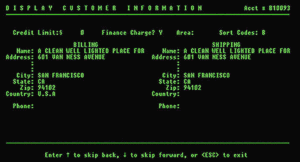The MLS is Not Your Friend
Et tu, MLS?
Were you there before the Multiple Listing Service “MLS” became the web-based platform it is now? I started in real estate right before the transition occured. The old MLS was accessed on the DOS computer system, you know, the black screen with the green letters. Real estate agents would punch in codes for their propery search and find listings. Then they  would print on that old-school computer lab paper with the perforated edges that you could tear off. There you had it, a list of properties for sale or comparables for your client – and your client depended on you to access this coveted data. You were the gatekeeper to all this cyptic information. The list of comparables or duplexes for sale made you a very valuable consultant. What came next for the industry would change an agent’s value radically.
would print on that old-school computer lab paper with the perforated edges that you could tear off. There you had it, a list of properties for sale or comparables for your client – and your client depended on you to access this coveted data. You were the gatekeeper to all this cyptic information. The list of comparables or duplexes for sale made you a very valuable consultant. What came next for the industry would change an agent’s value radically.
When I first saw listings posted online they looked beautiful. It was probably what seeing color TV for the first time felt like. No more green text codes, it was in an easy-to-read format with nice pictures. This was the beginning of our current era. Over the years, all of these fragmented and individually-owned MLSs would transition into more tech-friendly platforms. Then consolidation and data-sharing began. Fifteen years ago, there were several MLSs in the greater Los Angeles area, and data was not shared like it is now. I bounced back between Sandicor -the San Diego MLS, and SoCal MLS, which was the main MLS in Orange County. If I had out-of-area listings, then I had to do a reciprocal listing agreement with the other MLS and pay a fee for my listing to show up on the respective local MLS.
As the MLSs evolved, so did data-sharing. Listing data was fed to outside tech companies that would pay for it. Why, because consumers began looking at the internet for everything, so why wouldn’t real estate listings be on there as well. Naturally, with multiple tech companies trying to give consumers the best or most informative real estate experienced online, it started a race to offer the most data in the best format. This made a pivotal change to the industry. Consumers no longer needed agents for property information. They could go online and get it from tech companies. These companies became consumers of raw MLS data. MLS companies harvest that data from agents. We agents are like honey bees collecting nectar for the hive.
I always found the fragmentation of MLSs and local boards of realtors annoying. I liked CRMLS because I thought their platform was user friendly and their plan was  ambitious. They wanted to grow and do data shares with surrounding MLSs, which makes it easier for agents like us. If you work in Orange County but happen to take a listing in Riverside or San Diego, or even Ventura County, you can input that listing and it will show up in the same pool of data. This growth has been working great until a recent uptick of MLS fines signaled a stark change in the MLS relationship.
ambitious. They wanted to grow and do data shares with surrounding MLSs, which makes it easier for agents like us. If you work in Orange County but happen to take a listing in Riverside or San Diego, or even Ventura County, you can input that listing and it will show up in the same pool of data. This growth has been working great until a recent uptick of MLS fines signaled a stark change in the MLS relationship.
MLS Syndication
Before I talk about MLS fines, I should acknowledge the first big MLS controversy. Many agents knew that if consumers didn’t need them for access to MLS data then it would damage an agent’s value.In other words, it makes an agent more valuable if they can be the gatekeeper to MLS data. After all, you, the agent, are the person inputting the information. It’s your listing. The MLS was intended to be a database for professionals, not a data harvesting center. That said, many micro-movements have erupted to prevent or at least control whether listings are syndicated from the private MLS to all these publicly-facing tech companies. Here’s the catch though, that cat is out of the bag. Consumers, including homesellers want their listing syndicated to every tech company site imaginable. Plus, many agents have embraved this reality and market through these tech companies, ie Zillow Premier agent. I can tell you as a broker that nearly every client demands that their listing show up on Zillow or realtor.com. Pandora’s box was opened, the notion of not syndicating listing is not practical. The movement has and will go nowhere. As far as I’m concerned the case is closed on this. However, there is a new issue emerging.
Exorbitant MLS Fines
Remember, I have been a big supporter of CRMLS, but they have changed. I did a podcast episode on monopolies, which was inspired by CRMLS the biggest MLS in the nation. A few years ago, if there was an issue with the data entered into the MLS by an agent, CRMLS would send a warning email. If there was a mixup, there was a data integrity department, even someone you could call to help sort it out. I don’t know when the transition occured, but I assume it was spawned by a board of directors meeting. The CRMLS has a ruthlessly zero tolerance standpoint for data integrity. I first discovered this when an agent at Balboa Real Estate was fined a whopping $1500. What grave mistake did he make? Well, he took a screenshot of a google map showing the proximity of his listing to local shopping and added it to the library of images for his listing. Naturally, when told to remove the map image, he complied, but it was too late. The fine had been assessed. NO EXCEPTIONS. Here is the text you can expect if you seek a penalty waiver:
Unfortunately, CRMLS staff does not have the authority to waive or reduce any fine, as the amount of the fines is set by the CRMLS board of directors. If you wish to contest the issuance of Citation# xxxx-xxxxx, you may do so by filling out and submitting the Citation Review Request Form, located here: https://go.crmls.org/crmls–
citation-review-request/
Hey, it’s not up to CRMLS, the fine was set by the board. An ambigous group, many non-employees, that meet when, quarterly? So, if you were hoping to talk to a manager or something, well, sorry, tough luck. No one that works there has a say in the matter. In contrast, how much is a red light ticket? You know, an infraction that could kill people…generally ~$490. So, yeah, $1500 seems totally reasonable, yes I’m being sarcastic.
But wait, you can contest the violation – for $200. If you lose, you are out $1700 now! A local board recently told a Balboa agent she has only seen once person successfully overturn their fine. Just once. The odds are not in your favor. It’s a terrible $200 bet. You probably have better odds taking that $200 to a casino and winning the $1500 needed to pay the fine. than successfully contesting the violation.
If the average real estate agent makes $46,000 then a $1500 fine is 3.26% of the agent’s annual income, or 39% of that agent’s monthly income. What is the MLS thinking? The ostensible answer is they want to maintain strict criteria to ensure unblemished data. However, the penalty is unnecesary. All they have to do is suspend the listing. If they place the listing on hold then the agent will panic to fix the issue. If the agent is still uncooperative after a warning measure THEN assess a fine. Preferrably a figure more based in reality.
Not just one Balboa agent has been assessed the $1500 fine, but three have.
As an example of the most recent case. A Balboa agent had a lease listing. He asked the former listing agent if he could use his pictures for the lease listing. The former listing agent was cooperative. In fact, he was happy to agree, in writing, for the Balboa agent to use the pictures. The Balboa agent, appreciative of the favor, simply downloaded the pictures from the former listings and added them to his listing. Again, this was done with the other agent’s written permission. Perhaps it was the CRMLS watermark added to pictures, but something triggered a violation, in which the Balboa agent was accused of the unauthorized reproduction. Naturally, the Balboa agent contacted CRMLS to furnish them with a copy of the permission and clear up the misunderstanding. Not so fast, there is a process remember? This agent must apply for a citation review and pay $200 with no guarantee of repealing the penalty fee of $1500.
Now What?
What can you do? MLSs are growing bigger and consolidating when possible. When there is competition, a business must be courteous or else their customer will leave. Most MLSs, namely CRMLS don’t need to be courteous, few agents will bother to leave. They have become big enough to make the customer dispensable. There are so many of us, or at least enough of us with limited options that they don’t NEED to factor in the agent’s point of view very much. They can do as they please and funnel the agent through whatever policy labyrinth they construct. In summary, when a MLS gets so big that they are almost monopolistic, we get the benefit of expanded coverage. If things go wrong, we are left with few options. In this case, the outrageous penalties are the dark side of the otherwise useful MLS expansion. All I can say is be very careful not to violate the MLS policy and procedures. Contact me, ask me to double-check your listing draft, and don’t, for a second, think the MLS is your friend.





